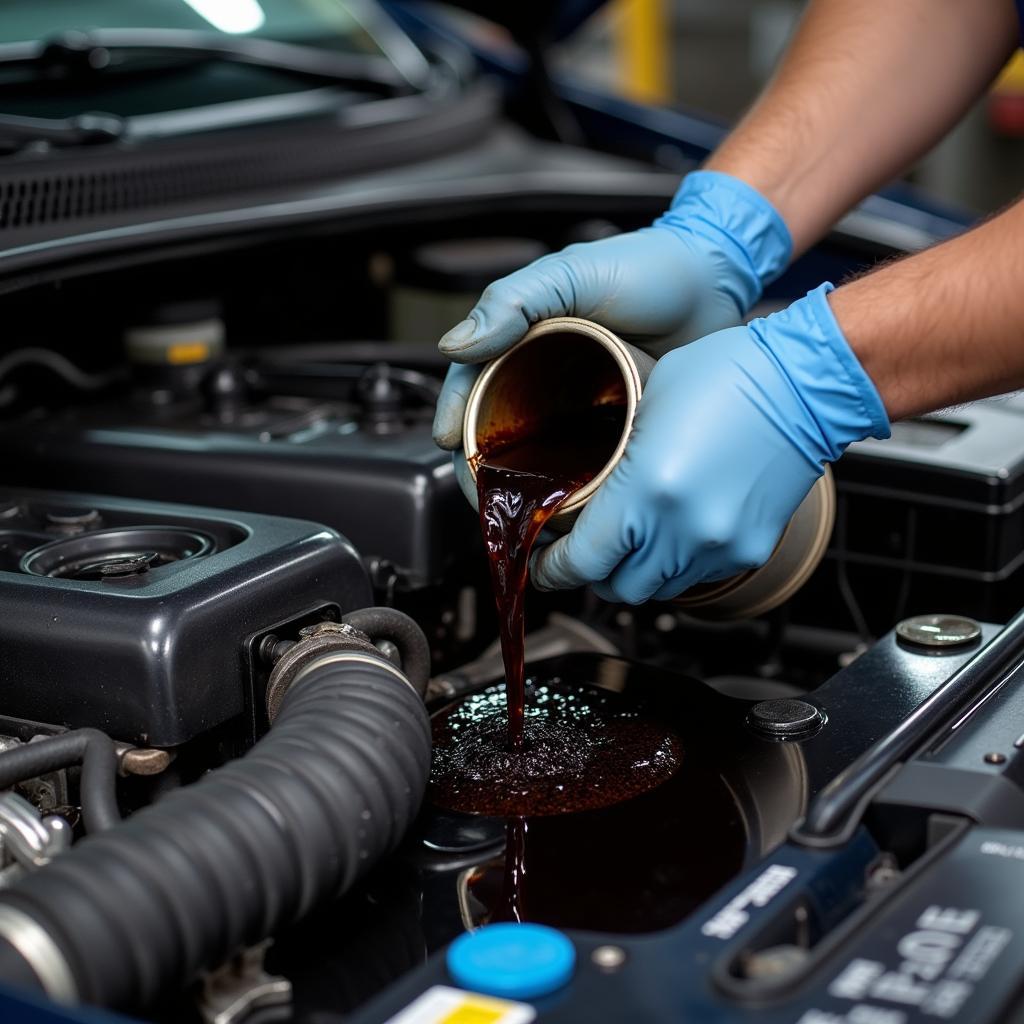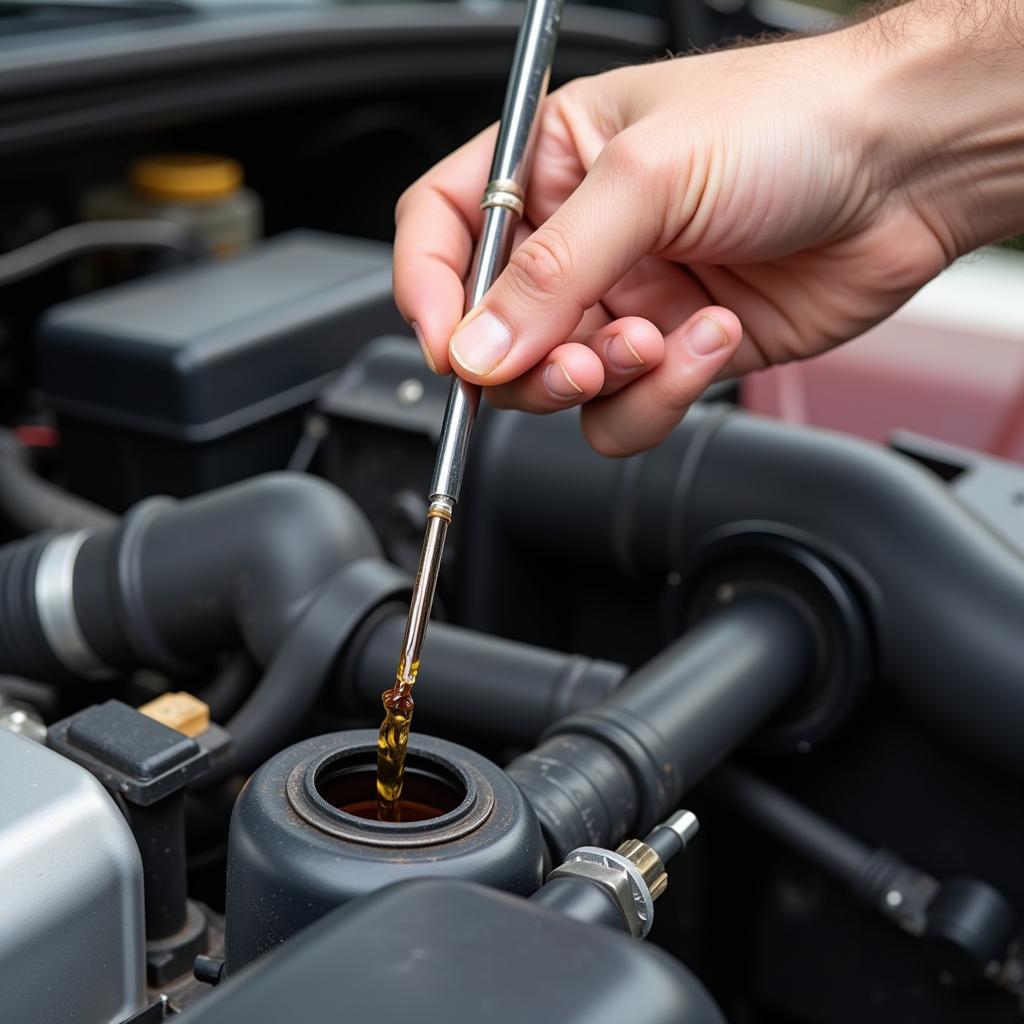Car Lubricant Service: Keeping Your Engine Running Smoothly
Car Lubricant Service, often referred to as an oil change, is one of the most essential maintenance tasks for your vehicle. It involves removing old, contaminated oil and replacing it with fresh lubricant, ensuring optimal engine performance and longevity. This comprehensive guide will delve into the intricacies of car lubricant service, providing you with valuable insights to make informed decisions about your vehicle’s well-being.
Why is Car Lubricant Service Crucial?
Engine oil serves as the lifeblood of your car’s engine, performing several vital functions:
- Reducing Friction and Wear: Lubricant forms a thin film between moving engine parts, minimizing friction and preventing premature wear and tear.
- Cooling Engine Components: Oil absorbs heat generated by the engine, preventing overheating and potential damage.
- Removing Contaminants: As oil circulates, it picks up dirt, debris, and combustion byproducts. Regular car lubricant service removes these contaminants, preventing engine sludge buildup.
- Sealing Engine Components: Oil helps seal the spaces between piston rings and cylinder walls, maximizing engine compression and power.
 Car Engine Oil Change
Car Engine Oil Change
Understanding Different Types of Car Lubricants
Choosing the right type of oil is crucial for optimal engine performance. Car lubricants are classified based on their viscosity (thickness) and performance additives.
- Viscosity: Viscosity refers to the oil’s resistance to flow. It is denoted by a numerical code, such as 5W-30 or 10W-40. The first number indicates the oil’s viscosity at low temperatures, while the second number reflects its viscosity at high temperatures.
- Performance Additives: Modern engine oils contain additives that enhance their performance and protect your engine. These additives can include detergents, dispersants, anti-wear agents, and corrosion inhibitors.
Always refer to your vehicle’s owner’s manual to determine the recommended oil viscosity and specifications for your specific make and model.
How Often Should You Get a Car Lubricant Service?
The frequency of car lubricant service depends on several factors, including your driving habits, vehicle age, and oil type.
- Conventional Oil: Vehicles using conventional oil typically require an oil change every 3,000 miles or three months, whichever comes first.
- Synthetic Oil: Synthetic oils offer superior performance and longevity, often lasting up to 7,500 miles or six months between changes.
- Severe Driving Conditions: If you frequently drive in harsh conditions, such as extreme temperatures, heavy traffic, or dusty environments, more frequent oil changes may be necessary.
It’s always best to err on the side of caution and consult your car’s owner’s manual or a trusted mechanic for personalized recommendations.
Signs Your Car Needs a Lubricant Service
Besides adhering to the recommended service intervals, it’s crucial to be aware of the following signs that indicate your car might need an oil change:
- Dark, Gritty Oil: Check your oil dipstick regularly. If the oil appears dark and gritty, it’s a sign that it’s contaminated and needs replacement.
- Loud Engine Noise: Insufficient or degraded oil can lead to increased engine noise, such as ticking or knocking sounds.
- Burning Oil Smell: A strong burning oil smell inside the cabin could indicate an oil leak or burning oil within the engine.
- Oil Warning Light: If the oil warning light on your dashboard illuminates, it’s crucial to stop driving immediately and seek professional assistance.
 Checking Car Oil Dipstick
Checking Car Oil Dipstick
Benefits of Regular Car Lubricant Service
Regular car lubricant service offers numerous benefits, including:
- Extended Engine Life: Clean oil minimizes friction and wear, significantly prolonging the lifespan of your engine.
- Improved Fuel Efficiency: Reduced friction within the engine allows for smoother operation, improving fuel economy.
- Enhanced Engine Performance: Fresh oil ensures optimal lubrication, maximizing engine power and performance.
- Reduced Risk of Costly Repairs: Regular oil changes can prevent major engine problems that can lead to expensive repairs.
- Lower Emissions: Clean oil promotes efficient combustion, reducing harmful emissions and minimizing your environmental impact.
Choosing the Right Car Lubricant Service Provider
When selecting a car lubricant service provider, consider the following factors:
- Reputation and Experience: Choose a reputable mechanic or service center with experienced technicians.
- Quality of Oil and Filters: Ensure they use high-quality oil and filters that meet your vehicle’s specifications.
- Comprehensive Service: Look for a provider that offers a comprehensive service, including oil and filter replacement, fluid level checks, and a visual inspection of other essential components.
- Pricing and Transparency: Obtain clear and transparent pricing upfront, including the cost of oil, filters, labor, and any additional services.
Conclusion
Car lubricant service is an indispensable aspect of vehicle maintenance, ensuring optimal engine performance, longevity, and fuel efficiency. By understanding the importance of regular oil changes, choosing the right lubricants, and being proactive in addressing potential issues, you can keep your car running smoothly for years to come.
Don’t neglect this crucial service – schedule your next car lubricant service appointment today!
FAQs about Car Lubricant Service
Q: Can I change my car’s oil myself?
A: While it is possible to change your own oil, it requires some mechanical knowledge and tools. If you’re not comfortable performing this task yourself, it’s best to leave it to a professional.
Q: What happens if I don’t change my car’s oil?
A: Neglecting oil changes can lead to engine sludge buildup, increased friction, overheating, and ultimately, catastrophic engine failure.
Q: How do I dispose of used motor oil?
A: Used motor oil is hazardous waste and should never be poured down the drain. Contact your local recycling center or auto parts store for proper disposal options.
Q: How much does a car lubricant service typically cost?
A: The cost of an oil change varies depending on the type of oil used, the service provider, and your vehicle’s make and model. On average, you can expect to pay between $30 and $80.
Need help finding a reliable car service near you? Check out our guides on car door lock service near me and car service md. You can also find information about specific car services like the Bosch silver service car. Not sure how often do cars need service? We have resources for that too! Looking for information on book car service Subaru? We’ve got you covered.
For any assistance, contact us via WhatsApp: +1(641)206-8880 or Email: [email protected]. Our dedicated customer service team is available 24/7 to assist you.

